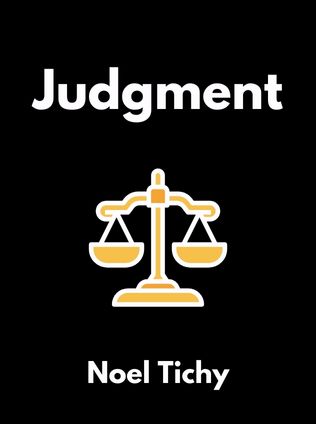
Judgment
How Winning Leaders Make Great Calls
By Noel Tichy,
Published 11/2009
About the Author
Noel M. Tichy is an influential figure in the world of leadership and management. He is a professor at the University of Michigan Business School and has authored several significant works, including Control Your Destiny or Someone Else Will, The Leadership Engine, and The Cycle of Leadership. His expertise lies in leadership development, organizational transformation, and strategic management.
Warren G. Bennis is a renowned authority on leadership. He is a university professor and distinguished professor of business administration at the University of Southern California. Bennis has written extensively on leadership, with notable works including On Becoming a Leader and Reinventing Leadership. His contributions to the field have shaped the understanding of leadership and its impact on organizational success.
Main Idea
The core of leadership, as proposed by Noel M. Tichy and Warren G. Bennis in their book Judgment: How Winning Leaders Make Great Calls, is the ability to make consistently good judgment calls. This skill is crucial, especially when the stakes are high, information is limited, and the right course of action is not obvious. Contrary to the common belief that good judgment is an innate trait, Tichy and Bennis argue that it is a skill that can be developed, refined, and nurtured throughout an organization.
Judgment is a contextually informed decision-making process encompassing three domains: people, strategy, and crisis. Each domain involves a three-phase process: preparation, the call, and execution. The quality of a leader's judgment, particularly in moments of ambiguity, uncertainty, and conflicting demands, determines the fate of the entire organization. Tichy and Bennis provide a framework for leaders to improve their judgment-making faculties, thereby helping their organizations achieve greater success.
Table of Contents
- Introduction to Judgment and Leadership
- Framework for Leadership Judgment
- The Three Judgment Domains
- The Process of Judgment Calls
- Resources and Constituencies
- Teachable Points of View and Storylines
- Character and Courage
- People Judgment Calls
- Strategy Judgment Calls
- Crisis Judgment Calls
- Knowledge Creation
- Judgment for Future Generations
- Conclusion
Introduction to Judgment and Leadership
On November 1, 1997, Michael Armstrong took the helm of AT&T, a $130 billion company at the time. Despite having a stockpile of cash and numerous opportunities, Armstrong's tenure was marked by poor strategic judgments, ultimately leading to the company's acquisition by its former subsidiary, SBC, in 2005 for $16.9 billion. In contrast, Jeff Immelt, who succeeded Jack Welch at General Electric (GE), demonstrated effective strategic judgment by shifting the company's primary business model towards emerging technologies and markets, leading to substantial growth. These contrasting stories illustrate the critical importance of judgment in leadership.
As Tichy and Bennis emphasize, the essence of leadership is judgment. The ability to make good judgment calls in the face of ambiguity, uncertainty, and conflicting demands is what distinguishes successful leaders. Good leaders are those who get the important calls right, even if they do not get all calls right. They discern which calls are crucial and ensure a higher percentage of these important calls are correct.
Sign up for FREE and get access to 1,400+ books summaries.
You May Also Like
The Subtle Art of Not Giving a F*ck
A Counterintuitive Approach to Living a Good Life
By Mark MansonRich Dad Poor Dad
What the Rich Teach Their Kids About Money - That the Poor and Middle Class Do Not!
By Robert T. KiyosakiHow To Win Friends and Influence People
The All-Time Classic Manual Of People Skills
By Dale CarnegieQuiet: The Power of Introverts
The Power of Introverts in a World That Can't Stop Talking
By Susan Cain



















